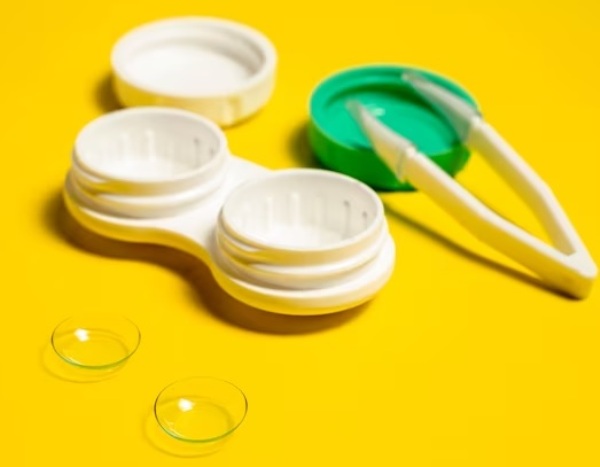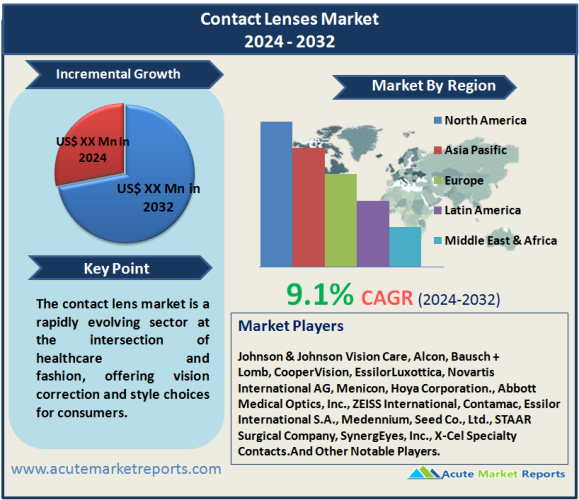
The contact lens market is a rapidly evolving sector at the intersection of healthcare and fashion, offering vision correction and style choices for consumers. The contact lenses market is expected to grow at a CAGR of 9.1% during the forecast period of 2025 to 2033, propelled by material innovations, diverse design options, and increased awareness, while manufacturing and distribution challenges pose notable restraints. Market segmentation highlights the dominance of silicone hydrogel lenses in 2024, with hybrid lenses and toric lenses projected for the highest CAGR during 2025-2033. Geographically, Asia-Pacific is a key growth region, and North America remains a significant revenue contributor. Competitive trends showcase a landscape dominated by key players adopting multifaceted strategies to stay ahead. Johnson & Johnson Vision Care, Alcon, Bausch + Lomb, and others are expected to continue shaping the market, leveraging technological advancements and market insights. As the contact lens market evolves, strategic positioning, innovation, and adaptability will be critical for sustained success in this dynamic industry.
Advancements in Material Technology
Material innovation is a pivotal driver for the contact lens market, with constant advancements improving comfort, breathability, and durability. In 2024, silicone hydrogel lenses gained prominence due to their enhanced oxygen permeability, reducing the risk of dry eyes and discomfort. Leading companies like Johnson & Johnson Vision Care and Alcon have invested in research and development, introducing materials that mimic the natural properties of the eye. These innovations have not only improved the wearing experience for users but have also expanded the addressable market, driving overall market growth.

Diverse Design Options Meeting Varied Needs
The market's growth is further propelled by the diverse design options available, catering to different vision needs. Spherical lenses, toric lenses for astigmatism, multifocal lenses addressing presbyopia, and other specialized designs offer a comprehensive solution for a wide range of users. Companies like Bausch + Lomb and CooperVision have been at the forefront of introducing and refining these design options. This driver not only addresses individual vision requirements but also taps into the growing demand for contact lenses as a lifestyle choice, contributing to the market's expansion.
Increasing Awareness and Adoption of Contact Lenses
The contact lens market has experienced a surge in awareness and adoption, driven by educational campaigns, improved affordability, and a growing preference for non-intrusive vision correction. Market leaders, including EssilorLuxottica and Novartis International AG, have actively participated in awareness initiatives. The widespread availability of information through digital channels has empowered consumers to make informed choices about contact lenses, contributing to the market's overall growth.
Challenges in Manufacturing and Distribution
Despite the market's positive trajectory, challenges in manufacturing and distribution present a significant restraint. The complex processes involved in producing contact lenses, especially those with advanced features, require stringent quality control measures. Companies face the challenge of ensuring mass production without compromising on product quality. Issues related to distribution logistics, storage, and transportation also impact the market. While companies like Menicon and Hoya Corporation have made strides in addressing these challenges, they remain a notable restraint influencing the market dynamics.
Market Analysis by Type of Material: Silicone Hydrogel Lenses Dominate the Market
In 2024, the contact lenses market experienced significant revenue from silicone hydrogel lenses, known for their enhanced comfort and breathability. However, the highest CAGR during the forecast period (2025-2033) is expected from hybrid lenses, combining the benefits of both gas-permeable and soft lenses. This dual-material approach offers a unique proposition, catering to specific user needs and ensuring sustained market growth.
Market Analysis by Design: Spherical Lenses Dominate the Market
Spherical lenses dominated the market in terms of revenue in 2024, meeting the basic vision correction needs of a broad user base. However, the highest CAGR during the forecast period is anticipated from toric lenses designed for astigmatism correction. This reflects a growing market for specialized lenses addressing specific vision challenges, indicating a shift in consumer preferences towards personalized eye care solutions.
North America Remains the Global Leader
Geographically, the Asia-Pacific region is poised to exhibit the highest CAGR, driven by increasing awareness, rising disposable income, and a growing urban population. North America is expected to contribute the highest revenue percentage, emphasizing the established market and consumer base in the region. These geographic trends highlight the need for tailored marketing strategies and regional considerations for market players to capitalize on diverse opportunities.
Market Competition to Intensify during the Forecast Period
In 2024, major players in the contact lenses market included Johnson & Johnson Vision Care, Alcon, Bausch + Lomb, CooperVision, EssilorLuxottica, Novartis International AG, Menicon, Hoya Corporation., Abbott Medical Optics, Inc., ZEISS International, Contamac, Essilor International S.A., Medennium, Seed Co., Ltd., STAAR Surgical Company, SynergEyes, Inc., and X-Cel Specialty Contacts. These companies adopted diverse strategies, including product launches, partnerships, and acquisitions, to strengthen their market positions. Johnson & Johnson Vision Care, for instance, focused on introducing innovative materials, while EssilorLuxottica emphasized awareness campaigns promoting contact lenses as a lifestyle choice. As of 2025, the overall competitive landscape indicates a dynamic market with companies strategically positioning themselves to capitalize on emerging trends. Revenues for 2025 and the expected landscape for the forecast period (2025-2033) reveal a competitive environment where innovation, market awareness, and geographic strategies play crucial roles in determining success.
Historical & Forecast Period
This study report represents analysis of each segment from 2023 to 2033 considering 2024 as the base year. Compounded Annual Growth Rate (CAGR) for each of the respective segments estimated for the forecast period of 2025 to 2033.
The current report comprises of quantitative market estimations for each micro market for every geographical region and qualitative market analysis such as micro and macro environment analysis, market trends, competitive intelligence, segment analysis, porters five force model, top winning strategies, top investment markets, emerging trends and technological analysis, case studies, strategic conclusions and recommendations and other key market insights.
Research Methodology
The complete research study was conducted in three phases, namely: secondary research, primary research, and expert panel review. key data point that enables the estimation of Contact Lenses market are as follows:
Market forecast was performed through proprietary software that analyzes various qualitative and quantitative factors. Growth rate and CAGR were estimated through intensive secondary and primary research. Data triangulation across various data points provides accuracy across various analyzed market segments in the report. Application of both top down and bottom-up approach for validation of market estimation assures logical, methodical and mathematical consistency of the quantitative data.
| ATTRIBUTE | DETAILS |
|---|---|
| Research Period | 2023-2033 |
| Base Year | 2024 |
| Forecast Period | 2025-2033 |
| Historical Year | 2023 |
| Unit | USD Million |
| Segmentation | |
Material
| |
Design
| |
Application
| |
Distribution Channel
| |
Usage
| |
|
Region Segment (2023-2033; US$ Million)
|
Key questions answered in this report